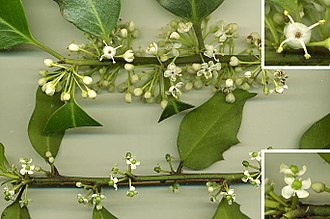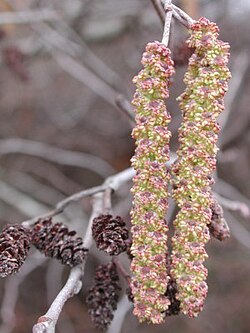Difference between revisions of "Translations:AY Honors/Flowers - Advanced/Answer Key/13/en"
From Pathfinder Wiki
(Importing a new version from external source) |
(Importing a new version from external source) |
||
| Line 1: | Line 1: | ||
=== Pistillate and Staminate === | === Pistillate and Staminate === | ||
| − | A flower is pistillate if it possesses only pistils, which are a plant's female reproductive structures. | + | A flower is pistillate if it possesses only pistils, which are a plant's female reproductive structures. If it possesses only stamens (the male reproductive structures), it is called ''staminate''. |
=== Monoecious and Dioecious === | === Monoecious and Dioecious === | ||
[[File:Tagalder8139.jpg|thumb|250px|left|The '''Alder''' is '''monoecious'''. Shown here: maturing male flower catkins on right, last year's female catkins on left]] | [[File:Tagalder8139.jpg|thumb|250px|left|The '''Alder''' is '''monoecious'''. Shown here: maturing male flower catkins on right, last year's female catkins on left]] | ||
[[File:Hollyflowers.jpg|300px|right|thumb|'''Holly''' (''Ilex aquifolium'') is dioecious: (above) shoot with flowers from male plant; (top right) male flower enlarged, showing stamens with pollen and reduced, sterile stigma; (below) shoot with flowers from female plant; (lower right) female flower enlarged, showing stigma <br />and reduced, sterile stamens with no pollen]] | [[File:Hollyflowers.jpg|300px|right|thumb|'''Holly''' (''Ilex aquifolium'') is dioecious: (above) shoot with flowers from male plant; (top right) male flower enlarged, showing stamens with pollen and reduced, sterile stigma; (below) shoot with flowers from female plant; (lower right) female flower enlarged, showing stigma <br />and reduced, sterile stamens with no pollen]] | ||
<br style="clear:both"> | <br style="clear:both"> | ||
Latest revision as of 15:30, 13 April 2021
Pistillate and Staminate
A flower is pistillate if it possesses only pistils, which are a plant's female reproductive structures. If it possesses only stamens (the male reproductive structures), it is called staminate.
Monoecious and Dioecious

Holly (Ilex aquifolium) is dioecious: (above) shoot with flowers from male plant; (top right) male flower enlarged, showing stamens with pollen and reduced, sterile stigma; (below) shoot with flowers from female plant; (lower right) female flower enlarged, showing stigma
and reduced, sterile stamens with no pollen
and reduced, sterile stamens with no pollen

